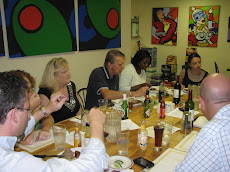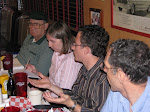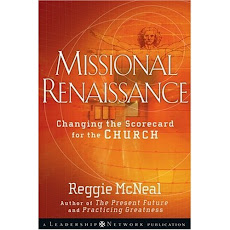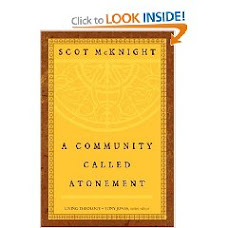 “People I am in community with are people that I can share things with that I’m most ashamed of and still be loved and accepted ... they are ‘refrigerator friends’ who can walk in and go to your refrigerator and take your last beer.” - Kennedy
“People I am in community with are people that I can share things with that I’m most ashamed of and still be loved and accepted ... they are ‘refrigerator friends’ who can walk in and go to your refrigerator and take your last beer.” - KennedyEleven of us met on June 2nd at Laura’s Cuban Restaurant in Hollywood to continue our discussion about postmodernism, community and emerging church and what it all means to us.
First, Kennedy shared his story about his spiritual journey and how it led him to the emerging church conversation and to our table. Kennedy is from Chattanooga, TN, the son of a Presbyterian minister. Having grown up as a pastor's kid and seeing some of the more problematic issues of church, he never wanted to go into ministry. At the same time, he had a passion for the church and a need for Christian community. In college Kennedy was part of the party scene. But he felt God used that time to break down his defenses in order to relate better with people. And he became known as kind of the unofficial “chaplain” of the party crowd he hung out with. One thing he noticed during this time was that everyone he met was on some kind of spiritual quest.
Kennedy decided to attend seminary. The experience stretched him, but also left him burned out. He eventually took a job in NYC in public relations working for celebs and dance clubs. He also worked in a church in upper Manhattan, where it was trendy and politically correct. The church also happened to be near the offices of people who campaigned for peaceful change in Central America. With them he was able to re-engage in church as mission locally recalling that “A light that shines the farthest, shines the brightest at home.”
Thereafter, Kennedy wanted to travel and visited multi-ethnic and multi-cultural churches during a mini-sabbatical. While in Pittsburgh and Philadelphia he experienced almost a second conversion as he gathered with vibrant church fellowships where members cheered as people walked down the aisle towards the alter towards transformed lives. This, he felt was the ultimate cause and God ignited a fervor in him to see more lives transformed by the God of love. During his travels, he would often hang out with the regular folks, doing what regular folks do (not always what church-going folks might approve of). During these times, conversations would turn to spiritual matters and the people that Kennedy hung out with were shocked to find out that the “church” had anything relevant to say about faith. During the sabbatical he explored the Taize Community and visited Willow Creek Community Church. During this time he also became engaged to marry, and then “dis-engaged.” And during this time he learned to desperately depend on God.
In DC, Kennedy became involved with a multi-cultural Baptist church. Here, he also met and conversed with Brian McLaren, author of A New Kind of Christian and who was pastoring at Cedar Ridge Community Church in MD at the time. They discussed the post-modern, emergent movement and how it can impact a very modern denomination like Presbyterianism. Kennedy went back to Long Island and made and saw major shifts in his church, focusing mainly on people re-connecting. Three years ago he came to Hollywood, FL where he pastors at First Presbyterian Church. His vision is for a congregation that is more organic, centered mostly in people’s homes, and one that reaches out to folks in Starbucks and bars more than one centered in a church building. He found out we have an emerging church Meetup close by and decided to check us out last year.
Matthew asked what Kennedy sees as the road map to move beyond the walls of traditional church. Kennedy feels that the key is to help ignite a passion in “church people” for the people who are not there, where diversity is valued and nothing is unexpendable. Steve F. shared how frustrated he is with a lot of “visions.” He wants to touch something supernatural when people get together. Kennedy agreed and clarified that “vision” arises out of community, not focus groups. We briefly discussed how these conversations typically involve movements such as “house churches” and “de-centralized leadership” which are more common models outside of the West. Steve F. gave some push back by imagining how irrelevant various “movements” can seem to Jesus.
Steve W. read a blog post from Scot McKnight, Kingdom Gospel 5, which concludes, “The Gospel is about church formation before it is about personal formation.” Michelle felt it has to really be the other way around, that you can’t have church transformation without personal transformation. Kennedy added that, that best happens when personal transformation happens in community. “You just can’t say a few words, a ‘sinner’s prayer,’ and typically expect transformation to happen right away.” Matthew felt that the post describes a road along which personal transformation happens, with community at the end. In the process, a new, alternative kingdom is created, where healing and justice replaces the broken society we too often encounter around us. Steve W. was reminded of John Wesley’s quote, “There is no holiness but social holiness.” Robin M. said though that is not about a “social movement” but about how we relate to one another.
Steve W. read some excerpts from Robin M.’s seminary paper, “Postmodernism, Community and the Emerging Church, Part 2 – ‘Restoring Community.’” Michelle asked, what is real community? To Robin M. it is about real relationships over time, starting with family. It is not a shared activity as is commonly thought of but is relationship based, and these relationships are not without problems that have to be worked through. Kennedy thinks of it this way, “People I am in community with are people that I can share things with that I’m most ashamed of and still be loved and accepted. These are people you can call at 2:00 in the morning. They are ‘refrigerator friends’ who can walk in and go to your refrigerator and take your last beer.” We agreed that we’re in community with our friends when we are committed to each other through both the fun times and the rough patches. Community can be messy. Robin M. said it this way, “A lot of people have not been loved through their issues and been shown God’s unconditional love by others. This is what it means when it’s said that the Christian life is caught more than taught.” Kathy added that this has to involve both people in a relationship being vulnerable with each other. Kennedy said he is very vulnerable with people in his church. And that he doesn’t have many clergy friends because they seem to feel they have to wear a mask. One of his closest friends is a Rabbi who is a recovering alcoholic. Finally, we were reminded of an observation by Mother Teresa who has seen so many in the “Third World” who have nothing in terms of material possessions, but who were beaming because they have each other.
We prayed for each other’s needs that some of us shared and agreed to meet again in a month to continue the conversation.
Steve













No comments:
Post a Comment